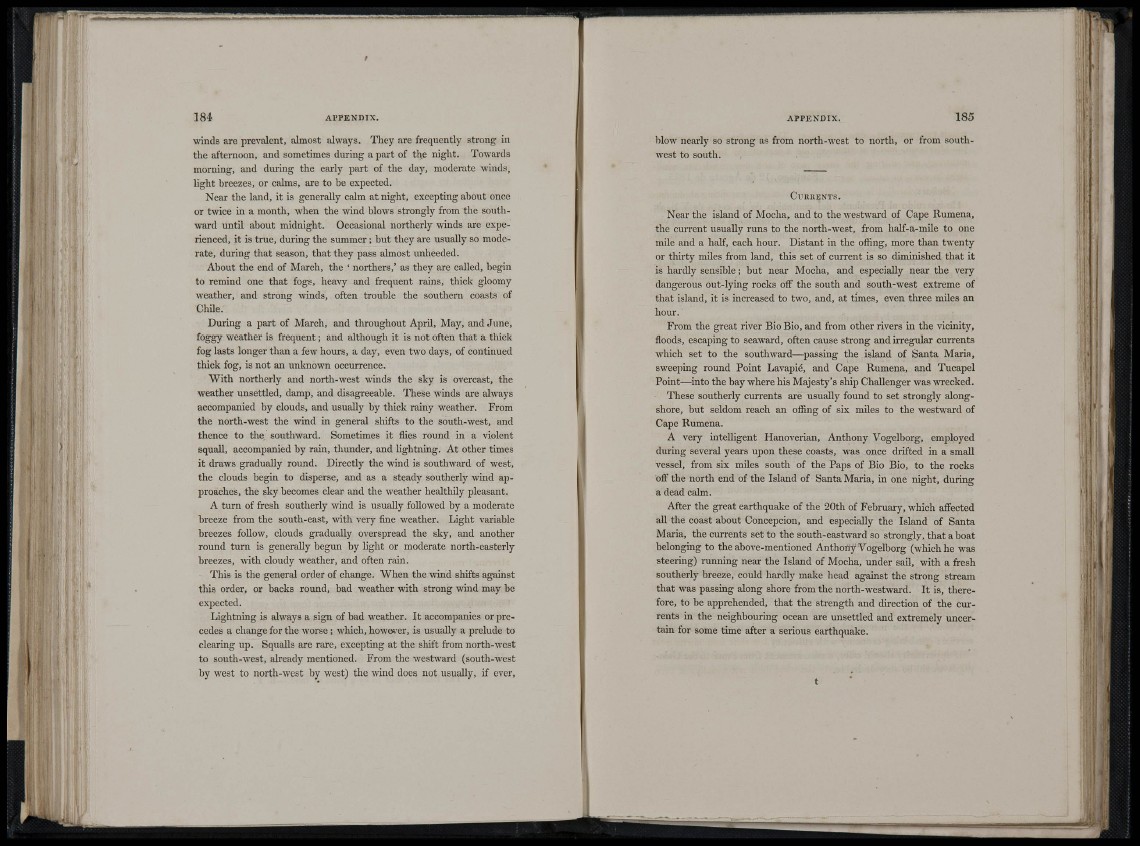
j! .
- >. •
íFi;-
: Í H
i,, i -i
184 APPENDIX.
winds are prevalent, almost always. They are frequently strong in
tlie afternoon, and sometimes during a i^art of th^ niglit. Towards
morning, and during the early jDart of the day, moderate winds,
light breezes, or calms, are to be expected.
Near the land, it is generally calm at night, excepting about once
or twice in a month, when the wind blows strongly from the southward
until about midnight. Occasional northerly winds are experienced,
it is true, during the summer; but they are usually so moderate,
during that season, that they pass almost unheeded.
About the end of March, the ' northers,' as they are called, begin
to remind one that fogs, heavy and frequent rains, thick gloomy
weather, and strong \vinds, often trouble the southern coasts of
Chile.
During a part of March, sind throughout April, May, and June,
foggy weather is frequent; and although it is not often that a thick
fog lasts longer than a few hours, a day, even two days, of continued
thick fog, is not an unknown occurrence.
With northerly and north-west winds the sky is overcast, the
weather unsettled, damp, and disagreeable. These winds are always
accompanied by clouds, and usually by thick rainy weather. From
the north-west the wind in general shifts to the south-west, and
thence to the southward. Sometimes it flies round in a violent
squall, accompanied by rain, thunder, and lightning. At other times
it draws gradually round. Directly the wind is southward of west,
the clouds begin to disperse, and as a steady southerly wind approaches,
the sky becomes clear and the weather healthily pleasant.
A turn of fresh southerly wind is usually followed by a moderate
breeze from the south-east, with very fine weather. Light variable
breezes follow, clouds gradually overspread the sky, and another
round turn is generally begun by light or moderate north-easterly
breezes, \dth cloudy weather, and often rain.
This is the general order of change. When the wind shifts against
this order, or backs round, bad weather with strong wind may bo
expected.
Lightning is always a sign of bad weather. It accompanies or precedes
a change for the worse; which, howeiv-er, is usually a prelude to
clearing up. Squalls are rare, excepting at the shift from north-west
to south-west, already mentioned. From the westward (south-west
by west to north-west by west) the wind does not usually, if ever.
APPENDIX. 185
l)low nearly so strong as from north-west to north, or from southwest
to south.
CURRENTS.
Near the island of Mocha^ and to the westward of Cape Rumena,
the current usually runs to the north-west, from half-a-mile to one
mile and a half, each hour. Distant in the offing, more than twenty
or thirty miles from land, this set of current is so diminished that it
is hardly sensible; but near Mocha, and especially near the very
dangerous out-lying rocks oiF the south and south-west extreme of
that island, it is increased to two, and, at times, even three miles an
hour.
From the great river Bio Bio, and from other rivers in the vicinity,
floods, escaping to seaward, often cause strong and irregular currents
which set to the southward—passing the island of Santa Maria,
sweeping round Point Lavapie, and Cape Rumena, and Tucapel
Point—into the bay where his Majesty's ship Challenger was wTecked.
These southerly currents are usually found to set strongly alongshore,
but seldom reach an offing of six miles to the westward of
Cape Rumena.
A very intelligent Hanoverian, Anthony Vogelborg, employed
during several years upon these coasts, -was once drifted in a small
vessel, from six miles south of the Paps of Bio Bio, to the rocks
OÍF the north end of the Island of Santa Maria, in one night, during
a dead calm.
After the great earthquake of the 20th of February, which aíFected
all the coast about Concepcion, and especially the Island of Santa
Maria, the currents set to the south-eastward so strongly, that a boat
belonging to the above-mentioned Anthony Vogelborg (which he was
steering) running near the Island of Mocha, under sail, with a fresh
southerly breeze, could hardly make head against the strong stream
that was passing along shore from the north-westward. It is, therefore,
to be apprehended, that the strength and direction of the currents
in the neighbouring ocean are unsettled and extremely uncertain
for some time after a serious earthquake.
IÍKÜI
ri. •